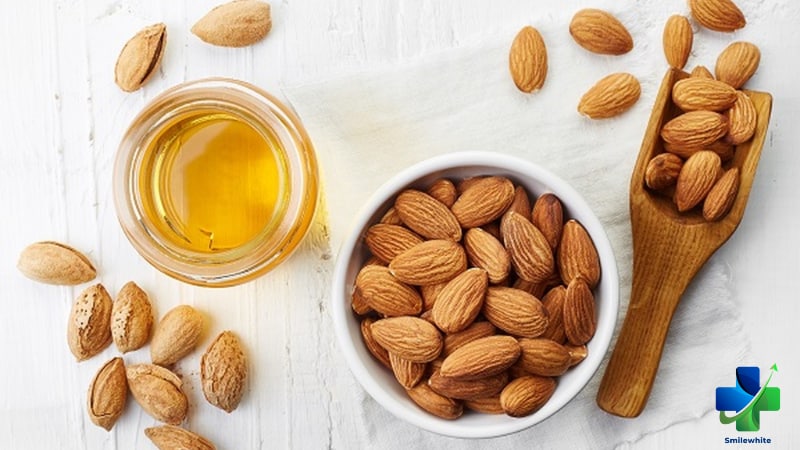Beauty Blog
Is Almond Oil Good for Your Hair? Discover the Benefits
Almond oil, extracted by pressing almond nuts, has been treasured in many ancient cultures for its healing and health benefits. This nutrient-rich oil is loaded with protein, omega-9 fatty acids, and vitamin E, all of which contribute to improving the shine and strength of your hair.
Sweet almond oil, in particular, is the most commonly recommended type for hair care. Let’s delve into the benefits of almond oil for your hair.
Is Almond Oil Good for Hair?
Yes, almond oil is indeed beneficial for your hair, especially when it comes to moisturizing and smoothing. Derived from the fruits of almonds (Prunus amygdalus), native to the Middle East and the Indian subcontinent, almond oil is packed with essential fatty acids like oleic, linoleic, and palmitic, along with being a rich source of vitamin E.
Dermatology nurse practitioner Jodi LoGerfo, DNP, highlights that while studies are limited, these components significantly contribute to almond oil’s effectiveness. Certified trichologist Kerry E.
Yates also praises almond oil for its benefits to both hair and scalp, noting its role as a natural antioxidant that offers protection. The added vitamins, minerals, and fatty acids make almond oil an excellent conditioner for your hair and skin.

Benefits of Almond Oil for Hair
Softens Your Hair
Almond oil is an excellent emollient, rich in essential fatty acids that moisturize both the scalp and hair strands.
Regular use results in healthy, smooth hair with a soft texture. By penetrating deeply, almond oil softens the hair at the roots and helps calm frizz.
Strengthens Hair and Makes It Easier to Repair
Almond oil is a nourishing oil rich in vitamins B7 (biotin) and E. These vitamins help make your hair strong and healthy. The antioxidants in vitamin E combat damage from free radicals, pollution, chemicals, and heat.
Regular use improves hair texture, fighting dryness and brittleness, while repairing the hair structure from the roots.
Promotes Hair Growth
Massaging almond oil into the scalp enhances blood circulation to the roots, promoting hair growth and strengthening the hair.
The biotin in almond oil reactivates dormant follicles by producing sufficient keratin, which helps thicken and grow thinning hair.
Treats Scalp Conditions
Almond oil’s antibacterial properties make it excellent for treating scalp issues, particularly dandruff.
It balances the fungus and yeast that cause dandruff and helps with flaky skin by loosening dead skin cells, making them easier to wash out.

How to Use Almond Oil for Hair Growth and Thickness
Almond Oil Head Massage
A head massage with almond oil is a highly effective way to combat hair loss and promote growth. It nourishes both the hair and scalp, restoring your hair to its healthiest state. This massage also creates a protective layer on your hair, shielding it from sun damage, pollution, and early greying.
To get the most out of almond oil:
- Heat the almond oil until it is lukewarm.
- Detangle your hair before applying the oil.
- Pour the oil onto your scalp and gently massage it in.
- Apply the oil along the length of your hair as well.
- Let it sit for 3–4 hours before washing it out.
Almond Oil Hair Mask
Using methi seeds and banana in this hair mask can effectively prevent dandruff and other hair issues like hair loss. Bananas smoothen and add shine to your hair.
To make the mask:
- Combine methi seeds and banana in a blender.
- Add a tablespoon of honey and a teaspoon of almond oil to create a smooth paste.
- Apply this mask to your scalp and the length of your hair.
- Leave it on for 15-20 minutes.
- Wash it off with lukewarm water.
Almond Oil Serum
An almond oil serum can give your hair a fuller appearance. When combined with aloe vera and lavender, it offers added benefits and helps prevent hair loss.
To make the serum:
- Mix three drops of lavender oil, two tablespoons of aloe vera gel, and one teaspoon of almond oil.
- Apply the serum to the length of your hair while it is still wet.

Who Should Use Almond Oil for Hair?
While almond oil is lightweight, it’s most suitable for individuals with dry, normal, or combination hair types. Even if you have an oily scalp or hair, you can still incorporate almond oil into your routine cautiously, focusing more on the mid-shaft to ends rather than directly on the scalp.
Renowned celebrity hairstylist Orlando Pita highlights, “Sweet almond oil is particularly beneficial for dehydrated, dry, damaged, and frizzy hair types.” Its hydrating properties effectively combat dryness, eliminate frizz, and impart a high-quality shine.
Notes:
- Dry Hair: Use almond oil regularly to maintain moisture levels and improve manageability.
- Damaged Hair: Almond oil can aid in repairing and protecting hair from further damage.
- Frizzy Hair: Apply almond oil to smooth frizz and enhance hair’s natural shine.
- Oily Hair: Apply sparingly on the ends to avoid greasiness while still reaping the nourishing benefits of almond oil.
Side Effects of Almond Oil
Sweet almond oil is generally safe for use on hair and skin. However, some people may want to avoid it:
- Tree Nut Allergies: People with tree nut allergies should not use almond oil, as it could trigger an allergic reaction.
- Acne-Prone Skin: Those with acne-prone skin who have not had success with other oils may want to avoid applying almond oil directly to the face, as it may block pores and cause pimples and breakouts.
- Eye Area Use: While almond oil can benefit eyelashes and eyebrows, always ensure that any product used near your eyes is safe and free of contaminants.
Notes:
- Patch Test: Always perform a patch test before using almond oil to check for any allergic reactions.
- Quality Assurance: Use high-quality, pure almond oil to avoid any potential contaminants.
- Moderation: Use almond oil in moderation to avoid clogging pores, especially if you have sensitive or acne-prone skin.
Conclusion
Now that you understand the benefits and application of almond oil for hair nourishment and strengthening, you might wonder: Is almond oil good for your hair?
Absolutely, unless you have allergies to almonds or other tree nuts. In such cases, it’s advisable to steer clear of almond oil.
If you’re uncertain about potential allergies, conducting a patch test is a wise precaution: apply a small amount of oil to your inner elbow, wait 24 hours, and check for any signs of redness or irritation. This simple step ensures you can enjoy the benefits of almond oil safely.
Please visit SmileWhite regularly to update other useful articles!
